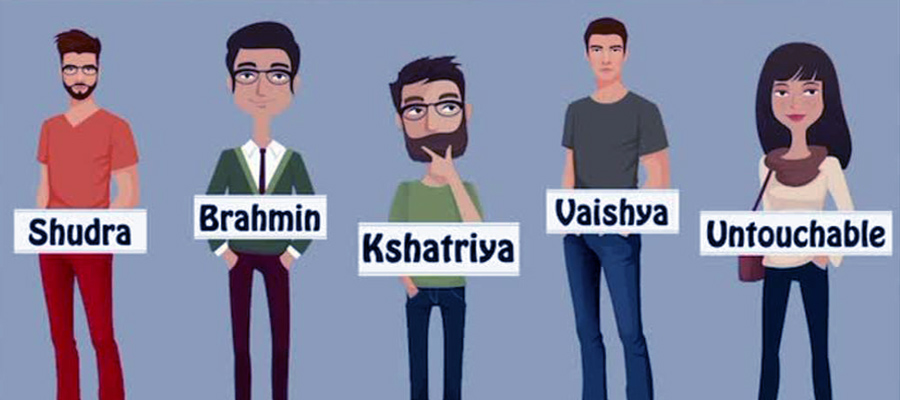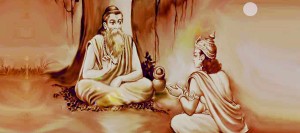Dharma is perhaps the key term for Hindu and Buddhist spiritual traditions, an understanding of the external world from the realm or the realm of inner consciousness. This is the basis of wide and diverse culture, a deep commitment to Yoga and meditation as a tool of Self Realization. Respecting the Dharma is very important because it implies certain values and ways of life that promote truth, unity and respect for all life above ideas or emotions.
Dharma in Sanskrit comes from the root ‘dhri’ meaning ‘to uphold’ and is symbolized by a pillar. It refers to the spiritual, ethical and natural principles that uphold the entire universe. Dharma has always been linked to Veda or vidya, which refers to an inner capacity to perceive the nature of things. It reflects a higher awareness pervades and underlies all existence.
Dharma is a very difficult term to define and eventually must be understood in its own right. To provide a basis for this, we could say that Dharma indicates both the nature of reality at a universal level as well as the proper place for each thing in the universe according to its particular qualities and capacities. There is specific dharma relative to each creature and every aspect of nature, as well as to the whole of existence. Dharma indicates the harmony both of the totality and the individual, which are complementary and interdependent. According to a dharmic view, the entire universe is present in each object and in every creature, which in some way embody or express the totality.
There is a dharma or natural way of working behind the great forces of nature, the five elements of earth, water, fire, air and ether, the seasons, the three worlds as earth, atmosphere and the heavens, and the different aspects of the cosmos as matter, energy, and light, which follow interrelated laws and patterns. There is dharma or unique quality and energy in every plant and animal which serves to make it what it is. Everything has its place in the Dharma, which reflects its role in the cosmic order. And there is special dharma or role on Earth for the human being, which is to seek to embody a higher truth and work to promote a higher consciousness in the world. The universe is an organically connected vibratory field in which all things are linked together into a greater network of harmony, beauty, and vitality.
There is dharma or way of right action relative to all aspects of human life and culture: the dharma of art, the dharma of business, the dharma of communication, the dharma of relationship, the dharma of science, the dharma of religion, and so on – each of which requires its own examination. What is done according to dharma is performed with grace, intelligence and respect for the natural order. Each different domain of our lives has certain principles and practices necessary to unfold its full potential, which constitutes its dharma. If we follow the dharma in what we do, we will not only be successful but will act so in a way that promotes the well-being of all.
The Social Dharma
Relative to society, the term Dharma is used in a special way as indicating the right way for society and its members to operate in harmony with their natures, with the environment and with the universe as a whole. This is what we could call the ‘social Dharma’. For social well being, there must be a proper understanding and implementation of Dharma on all levels.
In Vedic thought, human society is looked upon as the human body as a single organism with different limbs, organs, and functions, which all serve the benefit of the whole. The social organism is one in essence, but the role of different individuals, communities or professions must vary in order to fulfill the diverse and specialized needs of the whole. Such social differences should not become a matter of high and low or good and bad, but an organic necessity in which each particular role is vital, just as each organ of the human body has an important and irreplaceable role in the well-being of the entire body. We cannot forget society’s connection with the Earth and nature, if we want society to be healthy, harmonious and without violence.
There are special principles of Dharma or right living for society, nations, and communities, including special guidelines for men and women, the young and the old, for different professions and for different stages of life. There is an organic order to life, even at a social level, as there is in how our body functions.
However, Dharma also requires that our outer actions and life-styles change along with changing times and cultures. Dharma does not consist of rigid rules that can be blindly applied to all circumstances, but of guiding principles that require adaptation according to the differing needs of time, place and culture. The social Dharma cannot become rigid or the social organism will decline. This means that the vision of Dharma is more important than any specific formulation of dharma in a particular book or by a single person, though we should not discountenance the value of the dharmic wisdom from the past.
Today we need social dharma that can integrate what is best in science and technology while restoring our deeper connection with both Nature and the Spirit.
We have our own svadharma that reflects our capacities and aspirations in life. Yet this is not something that divides us from others. Each person has similar potentials that we must honor.
Dharma and Human Rights
Western political thought and modern democracies, in general, are based upon the idea of “human rights”, which are primarily defined on an individual basis, according to political ideals of freedom, equal opportunity, and justice for each person. These democratic principles have helped protect the individual, reducing oppression and discrimination on various levels within the society relative to race, ethnicity, gender, class, occupation, or other social affiliations.
Yet, on the negative side, an over fixation on “individual rights” encourages mere outer freedom to do what one wants that can make people more aggressive and acquisitive, lacking an inner dimension of spiritual search. Outer freedom without a corresponding inner aspiration can become a license for the ego to do what it wishes, even if it causes eventual harm to others or to the environment. It often becomes a hectic pursuit of the material world, running after the external allures of Maya.
Dharma, on the other hand, teaches us that life, liberty, and happiness are our inherent nature and can be found within ourselves, without the need for external seeking or accumulation of possessions. Dharma promotes freedom from any sort of outer dependency. This includes freedom from commercial exploitation and an inner orientation to life, which implies a spiritual search. Our role in life is not simply to gain what is due to us, as if the universe owed us a favor, but to help in the well-being of the world as a whole, which is part of our own greater nature. Our place in life is not simply to take, as if we existed in isolation, but to give, reflecting our relationship with the whole and the wholeness of who we really are.
Dharma and Duty
Dharma indicates duty, obligation, and responsibility as well as rights and freedom. Rights can never exist without corresponding duties and obligations. Unless rights and duties are balanced, the society itself will become imbalanced and disturbed. Each one of us no doubt has our individual place in the universe that must be honored and a destiny of our own Karma to be fulfilled, but we must also respect the universe upon which we depend and realize that our well being can never be secured at the cost of that of others.
In this regard, Dharma is connected to the idea of giving, offering, and sacrifice, what Vedic teachings call yajna. Yajna is symbolized by a fire sacrifice. Fire can only burn if given an offering of the proper fuel. Our place in life is to make the proper offering so that the universal fire of Dharma can illuminate both ourselves and the world around us. Ultimately, we must ourselves become an offering for all, rather than holding to our personal existence or private property as final.
Yajna says that our lives should consist of worship and honoring ancestors, other living creatures, all human beings, and the spiritual heritage of the entire human race. If each one of us acts for the good of all, we will all certainly flourish. If we act only for the good of ourselves, our family or our particular community, we will breed long term division, inequality, and violence.
Broader Human and Universal Rights
According to the principles of Dharma, it is not only individuals that have rights but all aspects of the social organism and the world of nature as a whole. Families have rights, as do communities, including the right not to be interfered with or to be broken up. Cultures have rights not to be denigrated or exploited, even in the name of progress. Today in the name of individual human rights many traditional communities and cultures are being devalued and denigrated, if not eliminated, often paving the way for commercial exploitation.
Animals have the right to live without human interference or exploitation and to have their natural space to move freely. Plants do so as well, as the plant also has consciousness and feeling. The world of nature does not exist solely for our own personal advantage as human beings. Each creature has its own existence that we must honor. Ecosystems also have a right to remain as they are and evolve according to their own energies, without being turned merely into human habitations or recreation sites.
When human rights do not respect the rights of other creatures, they invariably lead to conflict and problems in human society as well in the world of nature. The greater life organism of the biosphere gets damaged, which means that human beings will also not have a harmonious natural environment that can provide for health and well-being. This is what we are seeing today in which our environment has been damaged by making human needs, desires and profits predominate over the natural rights of other creatures and the sanctity of the Earth itself – in which we are failing in our duty to the universe in the blind pursuit of personal enjoyment.
Dharmic Pluralism
Dharma reflects a pluralistic view of life which honors unity in multiplicity. It recognizes that there is a diversity of human beings, with each individual being unique in one way or another. There cannot be one job all for all, one medicine for all, or even one religion or spiritual path for all.
Therefore, there should be a corresponding diversity in society in terms of culture, philosophy, art and spirituality so that each person or group has something that their particular Dharma can relate to and find fulfillment in. According to Dharma, unity lies not in uniformity of name, form or action but in the inner freedom that allows the individual to move through and beyond all outer forms to the inner essence that is one with all.





